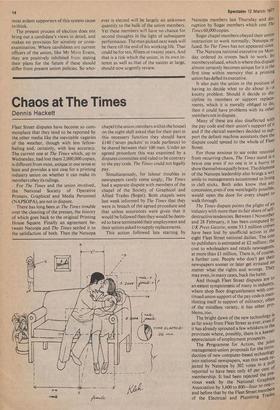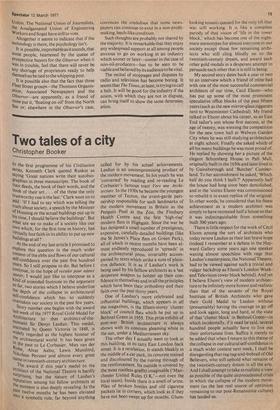Chaos at The Times
Dennis Hackett
Fleet Street disputes have become so commonplace that they tend to be reported by the other media like the inevitable vagaries of the weather, though with less fellowfeeling and, certainly, with less accuracy. The current one at The Times which, up to Wednesday, had lost them 2,000,000 copies, is different from most, unique in one sense at least and provides a test case for a printing industry union on whether it can make its members obey its rulings.
For The Times and the union involved, the National Society of Operative Printers, Graphical and Media Personnel (NAPSOPA), are not in dispute.
There has long been at The Times trouble over the cleaning of the presses, the history of which goes back to the original Printing House Square. Finally an agreement between Natsopa and The Times settled it to the satisfaction of both. Then the Natsopa chapel (the union members within the house) on the night shift asked that for their part in this necessary function they should have £.140 (*seven packets' in trade parlance) to be shared between their 100 men. Under an agreed procedure this was examined by a disputes committee and ruled to be contrary to the pay code. The Times could not legally pay.
Simultaneously, for labour troubles in newspapers rarely come singly, The Times had a separate dispute with members of the chapel of the Society of Graphical and Allied Trades (Sogat). Both chapels were last week informed by The Times that they were in breach of the agreed procedure and that unless assurances were given that it would be followed then they would be deemed to have terminated their employment and their unions asked to supply replacements.
This action followed late starting by
Spectator 12 March 1977 Natsopa members last Thursday and disruption by Sogat members which cost The Times 60,000 copies.
Sogat chapel members obeyed their union instruction to work normally; .Natsopa refused. So The Times has not appeared since.
The Natsopa national executive on Mon day ordered its troops back to work. Its members refused, which is where this dispute almost certainly becomes unique for it is the first time within memory that a printing union has defied its executive.
It also puts the union in the position of
having to decide what to do about it—a knotty problem. Should it decide to discipline its members or support replacements, which it is morally obliged to do, then it could have problems with its other members not in dispute. Many of these are also disaffected with the pay code and their union's support of it and if the clerical members decided to suPport the defiant machine assistants then the ' dispute could spread to the whole of Fleet Street.
For those anxious to see order restored from recurring chaos, The Times stand is a brave one even if no one is in a hurry to show themselves equal ly brave. The dilemma of the Natsopa leadership also brings a wrY smile to managements accustomed to living in cleft sticks. Both sides know that anY concession,even if one were legally possible, would open the door for every chapel to walk through.
The Times dispute points the plight of an industry with more than its fair share of selfdestructive tendencies. Between I November and 28 February, it has been computed bY UK Press Gazette, some 53.5 million copies have been lost by unofficial action in the eight Fleet Street national dailies. The cost to publishers is estimated at £2 million; the cost to wholesalers and retails newsagents, at more than £1 million. There is, of course, a further cost. People who don't get their newspapers sooner or later get irritated no matter what the rights and wrongs. They may even, in many cases, buck the habit. And though Fleet Street disputes are to an extent symptomatic of many in industry, where shop floor disgruntlement with continued union support of the pay code is manifesting itself in support of militancy, often o fth tmooindless variety, it has other problems, bright dawn of the new tech nologY as far away from Fleet Street as ever, even 11 it has already sprouted a few whiskers in the provinces where, possibly, there is a keener appreciation of employment prospects. The Programme for Action, the joint management-union proposals for the introduction of new computer-based technologY into national newspapers, was this week re: jected by Natsopa by 302 votes in a P°11, reported to have been only 45
Per cent oi
membership. It had been rejected the Pre" vious week by the National Graphica Association by 3,600 to 800—four to one and before that by the Fleet Street member of the Electrical and Plumbing Trades
Union. The National Union of Journalists, the Amalgamated Union of Engineering Workers and Sogat have still to vote.
Altogether it seems to indicate that if the technology is there, the psychology isn't.
It is possible, improbabIeas it sounds, that some people, heartened by the queue of Prospective buyers for the Observer when it was in trouble, feel that there will never be any shortage of proprietors ready to help themselves be tied to the whipping post.
It is possible also that the fact that three Fleet Street groups—the Thomson Organisation, Associated Newspapers and the Observer—are apparently, as a friend of mine put it, 'floating on oil' from the North Sea or, elsewhere in the Observer's case,
convinces the credulous that some newspapers can continue to exist in a non-profitmaking, lecch-1 ike condition.
Such thoughts are probably not shared by the majority. It is remarkable that they enjoy any widespread support at all among people anxious to go on working in an industry which sooner or later—sooner in the case of non-oil-producers—has to be seen to be viable and believed by its audience to be vital.
The recital of stoppages and disputes by radio and television has become boring. It seems that The Times, at least, is trying to call a halt. It will be good for the industry if the union, with which they are not in dispute, can bring itself to show the same determination.







































 Previous page
Previous page